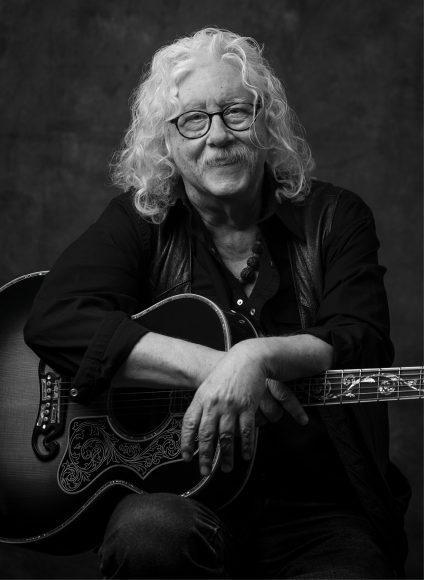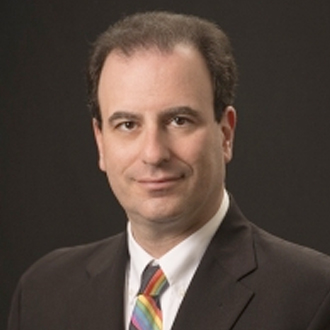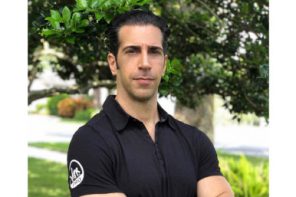Folk music icon Arlo Guthrie has been absent from the recording studio since his 2009 album “Tales of ’69,” but he has hardly been missing from the music scene. For the past decade, Guthrie has been a peripatetic presence in the concert touring world, reconnecting with audiences that remembered when “Alice’s Restaurant” and “City of New Orleans” were getting their first airplay and making the acquaintance of younger fans of the folk music sound.
The coronavirus pandemic disrupted Guthrie’s life on the road, and the 73-year-old singer/songwriter abruptly and unhappily found himself moored at home.
“The last gig we did was way back in early March in Tennessee,” he recalls. “And I flew home to my place in Florida and realized we weren’t going back out again. That was it. All of the venues started canceling or postponing until they finally all gave up and said, ‘OK, forget about it for this year. We’ll go back to work next year if things are OK.’”
The shutdown of the concert venues created a financial hardship for Guthrie, who relies on his road shows for a major portion of his income. It also created an emotional burden that he found difficult to accept.
“I’m struggling like everybody else with no money coming in, because we can’t do the gigs,” he continues. “I’ve been working on the road for over 50 years. It’s quite an adjustment to sit home. I mean, I’ve got a nice home — I’m not complaining about it — but I wish I could be out there doing what we do. That’s what I got born for. And now I’m just sitting here like everybody else. It takes a toll on you.”
Rather than remain inactive, Guthrie opted to return to recording with a fitting, poignant selection, “Hard Times Come Again No More,” youtube.com/watch?v=P17dz6B0x7Y written in 1854 by Stephen Collins Foster. And while the song has been a staple of the record industry since its 1905 appearance on an Edison Manufacturing Co. wax cylinder, Guthrie believes Foster’s pre-Civil War work reflects the miasma facing today’s America.
“Suffering is suffering,” he says. “It doesn’t really matter whether it’s 160 years ago or 5,000 years ago or 20 years from now. When people are having a difficult time, they suffer the same way as we always have and we always will.”
Guthrie is joined on his recording by pianist Jim Wilson, vocalist Vanessa Bryan, multi-Grammy Award-winning bassist Stanley Clarke, guitarist Andy McKee and a gospel choir. An accompanying music video features Guthrie amid a montage of stark photographs from the Great Depression and images of today’s pandemic and Black Lives Matter protests.
Unlike many performers during the pandemic, Guthrie has opted not to pursue Zoom or Facebook Live performances to stay in front of fans.
“We don’t have the facility here to do that,” he says, referring to his rural Massachusetts residence. “In other words, we don’t have the bandwidth to get out and do live stuff. We’re not in a big city. We’re out in the middle of nowhere and it’s very limiting as to what we can do live. Having said that, what we were able to do was to film some stuff, put it together and release that on the internet.”
Working with his collaborators on “Hard Times Come Again No More” was something of an eye-opener for Guthrie, whose previous recording studio session went along the traditional concept of musical talent piled into a single space.
“We started working on the project from home, which I had never done in my life,” he says. “So, it was totally new for me to be sending files back and forth and adding instrumentals and adding vocalists and adding arrangements and building it through the internet rather than being in the studio altogether. And, frankly, even though it was fun, it’s not something I really felt as comfortable with as being in the studio with other people live and all looking at each other and feeling it out and working it. I don’t know if anybody even does it anymore, but that’s the way I like to do stuff.”
Outside of his new recording, Guthrie is focusing his attention on The Guthrie Center, an interfaith venue based in an 1829 church in Great Barrington, Massachusetts, that serves as both a spiritual gathering space and an archive for Guthrie’s prominent musical family. He is also in conversations with theaters across the country to create a post-pandemic tour.
“We don’t know when the pandemic will end,” he acknowledges. “If it ends within the next year or two, that would be awesome. I don’t know how it ends — I haven’t seen a lot of talk about it — but as for the talk about going to work next year, I’m all excited for that. I’m gearing up. The instruments are tuned and packed and they’re ready to go.”
Until he gets the proverbial green light to hit the stage, Guthrie is remaining optimistic and vowing to keep hard times from his door.
“I think that the main thing is to stay active,” he says. “At my age, you don’t want to get too comfortable doing nothing, because it becomes habit-forming.”
For more, visit the guthriecenter.org.





